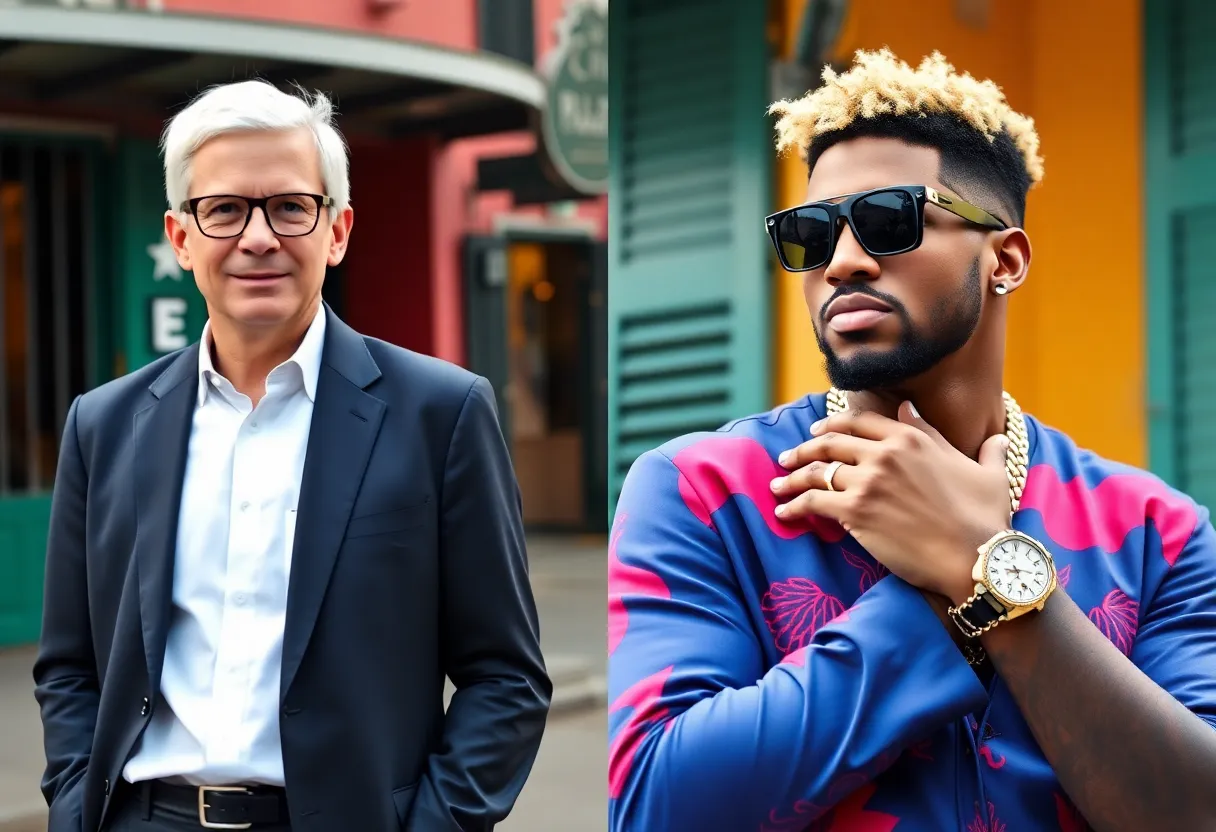News Summary
A recent outing in New Orleans sparked a fashion debate as Tim Cook and Odell Beckham Jr. displayed contrasting styles. Cook’s understated billionaire vibe clashed with Beckham’s flamboyant millionaire flare, representing broader societal discussions on wealth and fashion. The debate extends into shifting luxury consumerism, raising questions about sustainability and ethics in fashion.
Tim Cook vs. Odell Beckham Jr.: A Fashion Debate on Billionaire vs. Millionaire Style Emerges Following New Orleans Outing
This past weekend, a simple outing to a New Orleans restaurant turned into a lively debate over fashion and wealth as Apple CEO Tim Cook and football star Odell Beckham Jr. showcased their very different styles. While Cook donned a classic, understated outfit of trousers and a shirt, Beckham turned heads in a dazzling ensemble that prominently featured a stunning watch valued at a jaw-dropping $490,000.
Fashion Choices Reflecting Wealth
The stark contrast in their fashion choices sparked discussions online, highlighting what’s being referred to as “billionaire fashion” versus “millionaire fashion.” Tim Cook’s neat and simplistic look perfectly epitomizes the low-key style often preferred by the ultra-wealthy, suggesting that true affluence doesn’t require the spotlight. Meanwhile, Beckham’s eye-catching attire resonated with a more flamboyant approach to fashion, reminiscent of the many designers making headlines for their extravagant creations.
Interestingly, Cook’s net worth is estimated to be around 60 times greater than Beckham Jr.’s. Yet in the world of fashion, their differing styles bring forth a thought-provoking contrast: for many, the distinction in wealth might seem minor, especially as both individuals navigate their own very successful careers. This debate isn’t just about two celebrities; it reflects broader societal norms regarding how we display wealth through fashion.
Shifts in Luxury Consumerism
In recent years, luxury brands have increasingly been associated with middle and upper-middle-class consumers instead of the old-school elite. It’s curious to consider that billionaires often avoid ostentation, finding assurance in their financial stability, while middle-class consumers may feel the pressure to exhibit a sense of wealth, sometimes even purchasing luxury goods with credit. This shift has made it increasingly common to see everyday folks donning designer items, bringing up the question: Is luxury fashion becoming more accessible, or are we redefining what it means to be rich?
However, this trend hasn’t come without its shares of criticism. With reports of brands like Armani and Dior facing allegations of unethical practices, including the destruction of surplus stock to maintain an image of exclusivity, consumers are starting to think twice before investing in luxury. Not to mention, the environmental footprint of luxury fashion is staggering, having contributed to over $2 billion in greenhouse gas emissions in 2018 alone, accounting for around 4% of global emissions. These statistics push us to reconsider the practicality and morality behind designer labels.
Consumer Backlash and Future Trends
As the consumer interest in luxury brands wanes—evidenced by the falling stock prices of major brands like LVMH, Estée Lauder, Kering, and Burberry—the current climate presents a golden opportunity for shoppers to reassess their shopping habits. What if we shifted our focus from high-end conglomerate names towards independent artisan brands that prioritize ethics and sustainability? It’s a thought that many enthusiasts of fashion are getting behind.
So we find ourselves at a crossroads. Will we continue to succumb to the allure of false exclusivity, or will we seek out brands that foster a deeper connection of sustainability? The cultural influence of streetwear and logo-centric products reminds us that fashion is continually evolving, and how we want to participate in this evolution is entirely up to us.
In this era of changing fashion norms, perhaps it’s time to define our style not by extravagant labels but by meaningful choices that reflect *who we are* and *what we value* in our consumption.”
Deeper Dive: News & Info About This Topic
HERE Resources
Additional Resources
- Daily Free Press
- Vogue Business
- Reuters
- Jerusalem Post
- TheStreet
- Wikipedia: Luxury Goods
- Google Search: Luxury Brands
- Google Scholar: Luxury Fashion Impact
- Encyclopedia Britannica: Luxury Fashion
- Google News: Luxury Brands Debate








